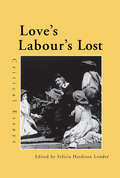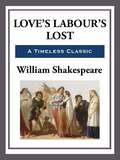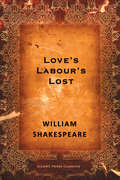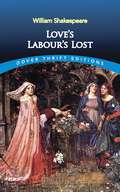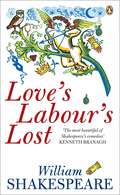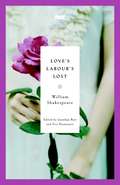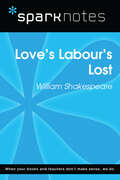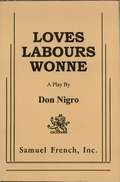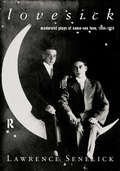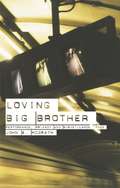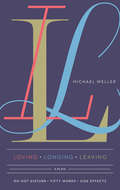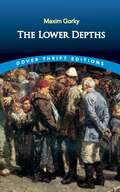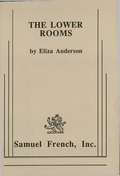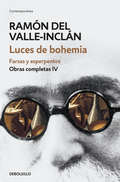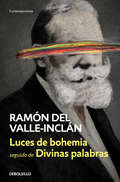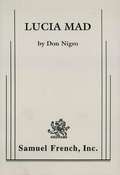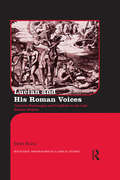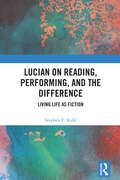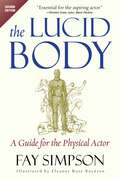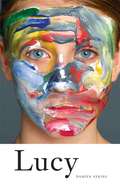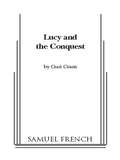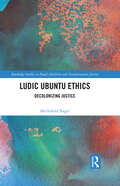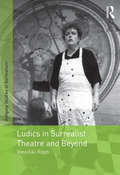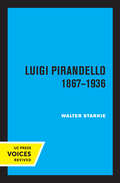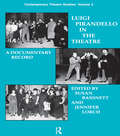- Table View
- List View
Love's Labour's Lost: Critical Essays (Shakespeare Criticism)
by Felicia Hardison LondreThis anthology examines Love's Labours Lost from a variety of perspectives and through a wide range of materials. Selections discuss the play in terms of historical context, dating, and sources; character analysis; comic elements and verbal conceits; evidence of authorship; performance analysis; and feminist interpretations. Alongside theater reviews, production photographs, and critical commentary, the volume also includes essays written by practicing theater artists who have worked on the play. An index by name, literary work, and concept rounds out this valuable resource.
Love's Labour's Lost
by William ShakespeareThe play opens with the King of Navarre and three noble companions, Berowne, Dumaine, and Longaville, taking an oath to devote themselves to three years of study, promising not to give in to the company of women - Berowne somewhat more hesitantly than the others. Berowne reminds the king that the princess and her three ladies are coming to the kingdom and it was suicidal for the King to agree to this law. The King denies what Berowne says, insisting that the ladies make their camp in the field outside of his court. The King and his men comically fall in love with the princess and her ladies.
Love's Labour's Lost: A Comedy
by William ShakespeareWhen Ferdinand, the king of Navarre, and his companions swear off of the company of women for three years in order to study and fast, they find themselves wholly unprepared for the lack of female company. By the time Princess of France and her ladies arrive, the men find themselves utterly beguiled by the women. Love's Labour's Lost is one of William Shakespeare's early comedies, believed to have been written in the mid-1590s for a performance at the Inns of Court before Queen Elizabeth I. The play draws on themes of masculine love and desire, reckoning and rationalization, and reality versus fantasy.
Love's Labour's Lost (Dover Thrift Editions: Plays)
by William ShakespeareIn this charming comedy of manners, one of Shakespeare's earliest efforts in the genre, a well-intentioned king vows to forego all fleshly delights, setting the stage for romantic hijinks. Ferdinand, the king of Navarre, insists that his court join him in a pledge to undertake a strict regimen of study and celibacy. The grudging compliance of three noblemen is sorely tested — as is the king's own resolve — with the arrival of a French princess and a trio of comedy attendants.First performed in 1594, Love's Labour's Lost features such typical Shakespearean elements as lovers in disguise, a witty clown, and an abundance of sparkling repartee. The play's role as a formative work (the plot is thought to be entirely of Shakespeare's invention) makes it of particular interest to students and scholars, and its merry doings and high spirts recommend it to all.
Love's Labour's Lost
by William ShakespeareA King and his lords form an austere academy, swearing to have no contact with women for three years. But when the Princess of neighbouring France arrives with her female attendants, their pledge is quickly placed under strain. Soon all are in smitten and confusion abounds, as each struggles to secretly declare his love in this comedy of deception, desire and mistaken identity.
Love's Labour's Lost (Modern Library Classics)
by William Shakespeare Jonathan Bate Eric RasmussenA continuation of the major series of individual Shakespeare plays from the world renowned Royal Shakespeare Company, edited by two brilliant, younger generation Shakespearean scholars Jonathan Bate and Eric RasmussenIncorporating definitive text and cutting-edge notes from William Shakespeare: Complete Works-the first authoritative, modernized edition of Shakespeare's First Folio in more than 300 years-this remarkable series of individual plays combines Jonathan Bate's insightful critical analysis with Eric Rasmussen's textual expertise.From the Trade Paperback edition.
Love's Labours Lost (SparkNotes Literature Guide Series)
by SparkNotesLove's Labours Lost (SparkNotes Literature Guide) by William Shakespeare Making the reading experience fun! Created by Harvard students for students everywhere, SparkNotes is a new breed of study guide: smarter, better, faster. Geared to what today's students need to know, SparkNotes provides: *Chapter-by-chapter analysis *Explanations of key themes, motifs, and symbols *A review quiz and essay topicsLively and accessible, these guides are perfect for late-night studying and writing papers
Loves Labours Wonne
by Don NigroComic drama / 9m, 5f (with doubling) / Unit set / Dark and strange, ribald, funny, sad and beautiful, this unique play takes audiences on an inspiring trip deep into William Shakespeare's soul. Late on the stormy night on which he is to retire to the country, Shakespeare staggers drunkenly onto the stage of the Globe Theatre. Longing for quiet, green Stratford yet grieving for the London theatre world that has been his life, he is tortured by memories and hallucinations of his early struggles in the vicious city quagmire. His daughters arise as Miranda and Ariel and join the notorious hack Robert Greene who comes from the dead to accuse him of Marlowe's murder. Queen Elizabeth makes a cameo appearance and people from his life mix with characters from his plays to create a wild hallucinatory investigation into the nightmare of art.
Lovesick: Modernist Plays of Same-Sex Love, 1894-1925
by Laurence SenelickThis volume makes available an international collection of plays, from Britain, the US, Germany, France and Russia, providing an essential and fascinating resource for anyone interested in the theatre culture of this period. Lovesick brings together six plays, each with individual introductions, including an author biography and a production history. The editor provides a contextual introduction to the volume offering valuable information about the ancestry of gay theatre and queer performance. The anthology reveals how 'sexual deviance' made its way into the drama of this time, and also how homosexual playwrights used comic or lyrical devices in order to celebrate a 'superior sensibility'.
Loving Big Brother: Surveillance Culture and Performance Space
by John McGrathIn Loving Big Brother the author tackles head on the overstated claims of the crime-prevention and anti-terrorism lobbies. But he also argues that we desire and enjoy surveillance, and that, if we can understand why this is, we may transform the effect it has on our lives. This book looks at a wide range of performance and visual artists, at popular TV shows and movies, and at our day-to-day encounters with surveillance, rooting its arguments in an accessible reading of cultural theory. Constant scrutiny by surveillance cameras is usually seen as - at best - an invasion of privacy, and at worst an infringement of human rights. But in this radical new account of the uses of surveillance in art, performance and popular culture, John E McGrath sets out a surprizing alternative: a world where we have much to gain from the experience of being watched. This iconoclastic book develops a notion of surveillance space - somewhere beyond the public and the private, somewhere we will all soon live. It's a place we're just beginning to understand.
Loving Longing Leaving
by Michael Weller"Fifty Words has a gimlet eye, providing meticulously chosen, artfully integrated details that let us understand why its characters so love and loathe each other. Like Mr. Albee's Who's Afraid of Virginia Woolf? it understands how closely hate and love can be linked in marriage."-The New York TimesIn Fifty Words, a Brooklyn brownstone becomes a marital battleground for Adam and Jan; Do Not Disturb dramatizes Adam's infidelity at a hotel with former lover Melinda; and in Side Effects, Melinda and her husband Hugh come to terms with their broken relationship.Michael Weller has written over forty dramatic works, including the plays Moonchildren, Fishing, Loose Ends, and Beast, and the screenplays for Hair and Ragtime.
The Lower Depths (Dover Thrift Editions)
by Maxim GorkyThe first of Russia's great proletarian writers, Alexey Maximovich Peshkov (1868-1936) adopted the pen name of Gorky, meaning "bitter." Drawing on his own experiences in the lowest social echelon, Gorky portrayed the wretched lives of down-and-outers, instilling his tales with heartfelt protest against a world that both tolerated and fostered the miseries of the underclass.In The Lower Depths, his dramatic masterpiece of 1902, Gorky presents a grimly realistic view of a desperate circle of lost souls. The play unfolds in a derelict boarding house, where a cast of despairing characters argue, play cards, tell stories, and debate the merits of two opposite worldviews: a self-reliant existence free of illusions, or a romanticized outlook that softens the pain of daily life. A revealing look at the atmosphere that led to the 1917 Russian Revolution, the drama abounds in shrewd observations, lifelike characters, and compelling dialog that make it a work of enduring vitality.
Lower Rooms (Eliza Anderson)
by Eliza AndersonFull length, drama / 3m, 2f / Interior / In the underground labyrinths of the soul stalk these creatures. A mother and a daughter, both seeking fulfillment from fleeting strangers the mother, from a man who brings her a bottle of wine, and lies abed with her with all his clothes on, and who stays on, perhaps to teach the daughter a lesson; the daughter, from a youth with a penchant for theft and sex and with a comrade dedicated to rapine. Scenes jump with startling alacrity and repositionings, as the harried daughter, with dreams of beauty and song, finds instead the bondages of S & M and evil, amid fugitive males.
Luces de bohemia: Farsas y esperpentos (Obras completas Valle-Inclán #4)
by Ramón del Valle-InclánEl segundo volumen con la producción teatral de uno de los autores más destacados de la España contemporánea: Ramón María del Valle-Inclán. En su incesante exploración de una nueva teatralidad, Valle-Inclán emprende muy pronto un radical proceso de estilización dramática que cultiva el grotesco, la farsa, el metateatro y la deshumanización de los personajes. Títulos como Tablado de marionetas (1926), Retablo de la avaricia, la lujuria y la muerte (1927) y Martes de Carnaval (1930), en que recoge su producción de dos décadas, son expresivos de una tendencia que culmina en la formulación de una nueva y portentosa estética, el esperpento, cuyas premisas expone en la que es considerada por muchos su obra maestra: Luces de bohemia (1924). Reseña:«Alrededor de él vivía la vorágine del verbo, y lo mismo se le podía llamar demiurgo que taumaturgo.»Ramón Gómez de la Serna
Luces de bohemia | Divinas palabras
by Ramón del Valle-Inclán«Los más jóvenes no se han cansado de proclamar en los últimos años la estricta actualidad de Valle, y ven en los esperpentos la más segura vía de un teatro crítico.» Antonio Buero Vallejo Escritas con pocos meses de diferencia, en 1919 y 1920, después de una prolongada crisis creativa, las dos piezas reunidas en este volumen son unánimemente consideradas la cima del teatro de Valle-Inclán, lo que vale por decir que se cuentan entre las cumbres indiscutibles del teatro español (y europeo) del siglo XX, sobre el que han ejercido una persistente influencia. Por vías distintas -pues sus escenarios respectivos son la Galicia rural y el Madrid de la bohemia modernista-, las dos marcan un punto de inflexión en la trayectoria de su autor, que funda a partir de ellas una estética propia, el esperpento, con la que aspira a captar «el espíritu trágico de la vida española». Reseñas:«Valle-Inclán parece que escribió para nosotros y para quienes vengan después que nosotros, y es al mismo tiempo nuestro predecesor y nuestro contemporáneo.»Antonio Muñoz Molina «Una poderosa inyección vigorizante para la literatura en idioma castellano.»Juan Carlos Onetti «Valle-Inclán, el gran renovador del teatro español del siglo XX.»Ramón Irigoyen, El País
Lucia Mad
by Don NigroDark comic drama / 4m, 2f / Simple set / This lyrical, intensely funny and haunting play about the madness of James Joyce's beloved daughter Lucia traces the imagined course of her doomed love for the young Samuel Beckett and investigates the relationship of creation to love and madness. Joyce is living in Paris and deeply absorbed in the composition of his last great work in progress eventually to become his enigmatic masterpiece Finnegan's Wake . He adores his beautiful and gifted daughter Lucia, but is unable to give her the attention she craves. Her down to earth, no nonsense mother, Nora, also loves her, but must spend much of her time looking after her absent minded genius husband. When Joyce's young disciple Beckett appears, Lucia falls madly in love with him and Beckett is torn between his reverence for Joyce, his compassion for Lucia, and his terror of her bottomless need for love. Lucia has a sharp eye and a wicked sense of humor, and she retains both as she slips deeper and deeper into madness despite the best efforts of Joyce, Nora, Beckett, Jung and Napoleon. This is a wildly funny play with complex and vivid characters, rich language and an eerie, eccentric and melancholy beauty.
Lucian and His Roman Voices: Cultural Exchanges and Conflicts in the Late Roman Empire (Routledge Monographs in Classical Studies #19)
by Eleni BoziaLucian and His Roman Voices examines cultural exchanges, political propaganda, and religious conflicts in the Early Roman Empire through the eyes of Lucian, his contemporary Roman authors, and Christian Apologists. Offering a multi-faceted analysis of the Lucianic corpus, this book explores how Lucian, a Syrian who wrote in Greek and who became a Roman citizen, was affected by the socio-political climate of his time, reacted to it, and how he ‘corresponded’ with the Roman intelligentsia. In the process, this unique volume raises questions such as: What did the title ‘Roman citizen’ mean to native Romans and to others? How were language and literature politicized, and how did they become a means of social propaganda? This study reveals Lucian’s recondite historical and authorial personas and the ways in which his literary activity portrayed second-century reality from the perspectives of the Romans, Greeks, pagans, Christians, and citizens of the Roman Empire
Lucian on Reading, Performing, and the Difference: Living Life as Fiction
by Stephen E. KiddLucian’s writings raise questions about the nature of reading and viewing the lives of others; this book explores these questions through close readings of Lucian’s dialogues and stories.Lucian scholarship over the past decades has been dominated by terms like performance and personas, so this book asks simply: what happens when we are not performing? When we read or sit in the audience, we cannot perform for the world we are viewing. Nor can we act on our desires and beliefs, since we have no self in that viewed world to move around like an avatar. Is there anything left of us at such moments? As a satirist, Lucian explored these questions not through philosophical arguments but stories – a traveler who looks down on earth from the moon, a philosopher who retires to a contemplative life “as if high up in a theater”, a narrator who demands that a reader not believe anything he writes, and many more. Over the course of seven chapters, this book explores these questions of reading, performing, and the difference via detailed analyses of some of Lucian’s best-known works: Hermotimus, Charon, Icaromenippus, Nigrinus, Rooster, True Stories, and others.Lucian on Reading, Performing, and the Difference is suitable for students and scholars of ancient Greek literature, Classics and the Humanities, particularly those interested in questions about Lucian and literary interpretation.
The Lucid Body: A Guide for the Physical Actor
by Fay Simpson&“From Fay&’s methodology, I learned to use my intuition and lived experiences in myriad new ways.&” —Winston Duke, actor, Black Panther, Avengers, Us, and Nine DaysEngaging Mind and Body to Develop the Complete Physical Nature of Characters Actors are shape-shifters, requiring the tools to wade into unfamiliar waters and back out again. The Lucid Body offers a holistic, somatic approach to embodying character from the inside-out and, for the non-actor, offers a way to give hidden parts of the self their full expression. By identifying stagnant movement patterns, this process expands one&’s emotional and physical range and enables the creation of characters from all walks of life—however cruel, desolate, or jolly. Rooted in the exploration of the seven chakra energy centers, The Lucid Body reveals how each body holds the possibility of every human condition. Readers will learn how to: Practice a non-judgmental approach to the journey of self-awarenessBreak up stagnant and restrictive patterns of thought and movementAllow an audible exhale to be the key to unlocking the breathDevelop a mindset to &“hear&” one&’s inner bodyAnalyze the human condition through the psycho-physical lens of the chakrasExperience the safety of coming back to a neutral bodyAcquire a sense of clarity and calm in one&’s everyday life A step-by-step program guides the actor through the phases of self-awareness that expand emotional and physical range not only on stage, but also in daily life. This new edition includes a more diversified range of playwrights, non-binary language, and new chapters on stage intimacy protocol and physical listening. Exercises that have been honed for the past ten years have been made more concise. New somatic and neuro-scientific data has been added, with additional wisdom and insights from colleagues and Simpson's team of Lucid Body teachers.
Lucy
by Damien AtkinsReluctantly, Vivian agrees, although motherhood is something that she never desired. Overwhelmed by the particulars of Lucy's care and unable to connect with her daughter at first, Vivian soon realizes that Lucy isn't that different from her—socially awkward, emotionally withholding, and reclusive—and slowly comes to believe that she and Lucy are the next step in the evolutionary chain. A powerful play about the relationship between mother and daughter, the power of love, and the rare moments in life when something, or someone, comes along and forces us to re-evaluate our own lives and the way we respond to the world around us.
Lucy And The Conquest
by Cusi Cram5m, 3f, doubling possible / Dramatic Comedy / Pill popping Lucy Santiago heads to her family home in Bolivia after being fired from the syndicated hit "Beach Detectives". All she wants to do is forget her troubles but her wildly eccentric family and a mysterious spirit that lives under Simon Bolivar's campaign bed won't let her. Lucy is forced to confront her own troubled history as well as the history of a conquered people. / "Lucy and the Conquest is a wild ride." - Jeffrey Borak, Berkshire Eagle
Ludic Ubuntu Ethics: Decolonizing Justice (Routledge Studies in Penal Abolition and Transformative Justice)
by Mechthild NagelLudic Ubuntu Ethics develops a positive peace vision, taking a bold look at African and Indigenous justice practices and proposes new relational justice models. ‘Ubuntu’ signifies shared humanity, presenting us a sociocentric perspective of life that is immensely helpful in rethinking the relation of offender and victim. In this book, Nagel introduces a new theoretical liberation model—ludic Ubuntu ethics—to showcase five different justice conceptions through a psychosocial lens, allowing for a contrasting analysis of negative Ubuntu (eg., through shaming and separation) towards positive Ubuntu (eg., mediation, healing circles, and practices that no longer rely on punishment). Providing a novel perspective on penal abolitionism, the volume draws on precolonial (pre-carceral) Indigenous justice perspectives and Black feminism, using discourse analysis and a constructivist approach to justice theory. Nagel also introduces readers to a post secular turn by taking seriously the spiritual dimensions of healing from harm and highlighting the community’s response. Spanning disciplinary boundaries and aimed at readers seeking to understand how to move beyond reintegrative shaming and restorative justice theories, the volume will engage scholars of criminology, philosophy and law, and more specifically penal abolitionism, social ethics, peace studies, African studies, critical legal studies, and human rights. It will also be of great interest to practitioners and activists in restorative justice, mediation, social work, and performance studies.
Ludics in Surrealist Theatre and Beyond (Studies in Surrealism)
by Vassiliki RaptiTaking as its point of departure the complex question about whether Surrealist theatre exists, this book re-examines the much misunderstood artistic medium of theatre within Surrealism, especially when compared to poetry and painting. This study reconsiders Surrealist theatre specifically from the perspective of ludics-a poetics of play and games-an ideal approach to the Surrealists, whose games blur the boundaries between the 'playful' and the 'serious.' Vassiliki Rapti's aims are threefold: first, to demystify André Breton's controversial attitude toward theatre; second, to do justice to Surrealist theatre, by highlighting the unique character that derives from its inherent element of play; and finally, to trace the impact of Surrealist theatre in areas far beyond its generally acknowledged influence on the Theatre of the Absurd-an impact being felt even on the contemporary world stage. Beginning with the Surrealists' 'one-into-another' game and its illustration of Breton's ludic dramatic theory, Rapti then examines the traces of this kind of game in the works of a wide variety of Surrealist and Post-Surrealist playwrights and stage directors, from several different countries, and from the 1920s to the present: Roger Vitrac, Antonin Artaud, Günter Berghaus, Nanos Valaoritis, Robert Wilson, and Megan Terry.
Luigi Pirandello, 1867 - 1936, 3rd Edition
by Walter StarkieThis title is part of UC Press's Voices Revived program, which commemorates University of California Press’s mission to seek out and cultivate the brightest minds and give them voice, reach, and impact. Drawing on a backlist dating to 1893, Voices Revived makes high-quality, peer-reviewed scholarship accessible once again using print-on-demand technology. This title was originally published in 1965.
Luigi Pirandello in the Theatre
by Susan Bassnett Jennifer LorchFirst Published in 1993. Routledge is an imprint of Taylor & Francis, an informa company.
